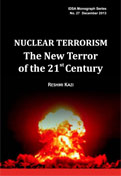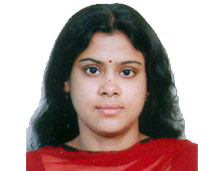Nuclear Terrorism: The New Terror of the 21st Century
 Nuclear terrorism is the most serious danger the world is facing today. Terrorist groups like Al Qaeda and Aum Shinrikyo have expressed their interest in acquiring a nuclear weapon. According to the 9/11 Commission of 2004, “Al Qaeda has tried to acquire or make nuclear weapons for at least ten years… and continues to pursue its strategic goal of obtaining a nuclear capability.” The most challenging part in a nuclear terrorism act is the acquisition of fissile material. But once acquired, only 25 kg of HEU would be sufficient for terrorists could make an improvised nuclear device. There exists speculation whether terrorists will be able to construct a nuclear device if they successfully acquired the fissile material. However, considering the availability of vast literature on how to build a nuclear bomb, it can be assumed that though difficult it may not be an impossible task to develop a crude nuclear device. Besides, in my interactions with scientists in Washington, DC, I found that it is a possible task for terrorists to build a crude nuclear device if the requisite fissile material is obtained by them. The only way to prevent this is to secure nuclear materials from falling into the wrong hands.
Nuclear terrorism is the most serious danger the world is facing today. Terrorist groups like Al Qaeda and Aum Shinrikyo have expressed their interest in acquiring a nuclear weapon. According to the 9/11 Commission of 2004, “Al Qaeda has tried to acquire or make nuclear weapons for at least ten years… and continues to pursue its strategic goal of obtaining a nuclear capability.” The most challenging part in a nuclear terrorism act is the acquisition of fissile material. But once acquired, only 25 kg of HEU would be sufficient for terrorists could make an improvised nuclear device. There exists speculation whether terrorists will be able to construct a nuclear device if they successfully acquired the fissile material. However, considering the availability of vast literature on how to build a nuclear bomb, it can be assumed that though difficult it may not be an impossible task to develop a crude nuclear device. Besides, in my interactions with scientists in Washington, DC, I found that it is a possible task for terrorists to build a crude nuclear device if the requisite fissile material is obtained by them. The only way to prevent this is to secure nuclear materials from falling into the wrong hands.
About the Author
Dr Reshmi Kazi is Associate Fellow in the Institute for Defence Studies and Analyses, New Delhi. She specializes in areas of nuclear non-proliferation, nuclear terrorism and nuclear disarmament issues. Her doctoral thesis is on ‘Evolution of India’s Nuclear Doctrine: A Study of Political, Economic and Technological Dimensions’ from Jawaharlal Nehru University, New Delhi. She is presently working on the importance of nuclear security issue in IDSA. She has made several presentations both in India and abroad. She represented India at the Seminar on ‘Partnership to Promote Weapons of Mass Destruction Non-proliferation’ organized by Near East South Asia Centre (NESA) for Strategic Studies and Defence Threat Reduction Agency (DTRA) from 25 September to 11 October 2013 in Washington DC and presented on India’s efforts to combat the danger of WMD trafficking. She also regularly blogs on strategic issues for the Generation Why website organized by the South Asia Program of the Stimson Center.








